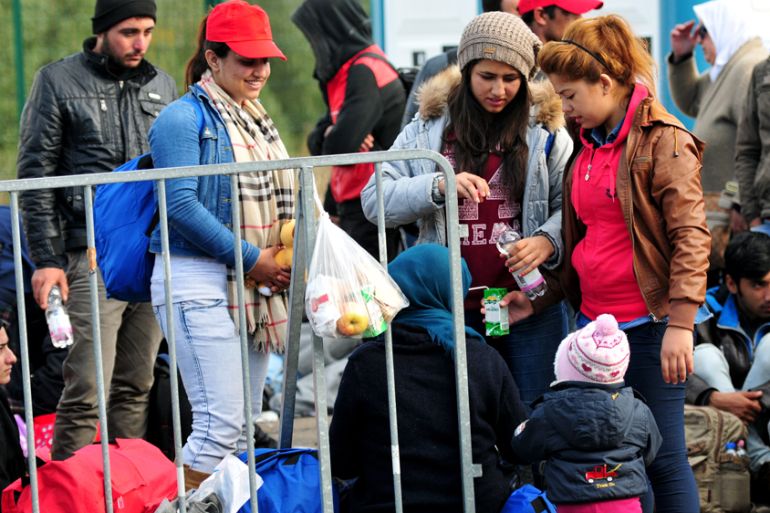Slovenia to slow refugee flow over fears of bottleneck
Ljubljana says it will only process up to 2,500 refugees a day to ease pressure on both its own and Austria’s borders.

Slovenia has warned it would be forced to slow down the rapidly rising influx of refugees arriving from Croatia and Serbia after Hungary shut its borders, raising fears of a bottleneck effect in the country.
The government in Ljubljana on Sunday said it had refused to allow in a train carrying 1,800 refugees from Croatia, after more than 3,000 people surged into the tiny EU member state the day before.
Keep reading
list of 4 items‘Mama we’re dying’: Only able to hear her kids in Gaza in their final days
Europe pledges to boost aid to Sudan on unwelcome war anniversary
Birth, death, escape: Three women’s struggle through Sudan’s war
Around half of the refugees have already continued their journey to neighbouring Austria, another key transit country for tens of thousands of refugees, mostly from Syria, seeking to reach Germany.
Slovenia stressed it would remain firm in its decision to handle up to 2,500 refugees a day to help ease pressure on both its own and Austria’s borders.

“Croatia has demanded that we manage 5,000 migrants per day while Austria has told us that, due to the pressure they are under, they can’t handle more than 1,500 people a day,” interior ministry spokesman Bostjan Sefic said at a press conference in Ljubljana.
Pressure on Croatia increased after Hungary closed its frontier to refugees with razor wire early on Saturday in a bid to block the path for refugees fleeing war and poverty in the Middle East, Africa and Asia.
Fears of ‘spillover’
Budapest had already sealed its border with non-EU neighbour Serbia a month ago, rerouting the migrants’ flow towards its border with Croatia.
OPINION: Europe should consult its refugees
Slovenia fears that, if Croatia continues taking more refugees than it is able to send forward, there could be a “spillover” of refugees.
“Measures are being considered” to secure the border in such a case, Sefic said.
Slovenia said on Saturday it would deploy its army to help assist border police with “logistics and equipment”.
“The army’s assistance does not mean there is an extraordinary situation in Slovenia, but that the government wants to manage the situation at the border,” centrist Prime Minister Miro Cerar said.
Some 300km to the southeast of Ljubljana, about 2,000 refugees were queueing at the Serbian border with Croatia.
Hundreds of people, some in jackets or blankets handed out by volunteers, were sitting on pieces of cardboard on the ground as they waited, while children of all ages were running and laughing as they played together.
“We’ve been here since 7 this morning and I am dead tired after 48 hours in buses,” said 23-year-old Rawan from Damascus as she helped volunteers from the Czech Republic to explain to refugees what was happening.
“We just want to continue our journey and I hope I will cross the border before dark,” said Rawan, who was travelling with her father and 12-year-old sister.
Once they enter Croatia, the refugees are transported by bus to a refugee centre in the village of Opatovac. From there they are either taken to a train station or put on buses headed for Slovenia.
“Everything has slowed down since Hungary closed the border,” a police officer at the Berkasovo border crossing in Serbia told AFP news agency.